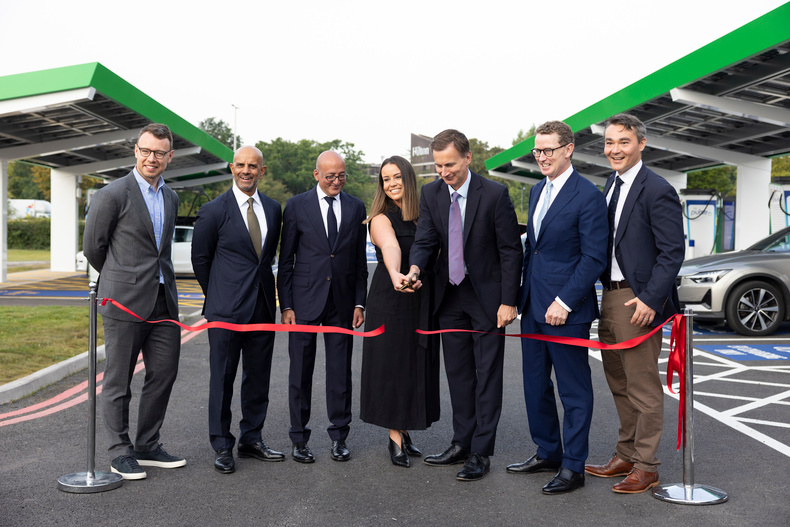£381m boost for EV charging as Chancellor opens hub at NEC

The UK's largest public electric vehicle (EV) charging hub has been launched at the NEC campus in the West Midlands.
This Gigahub was officially opened yesterday by The Chancellor of the Exchequer, The Rt Hon Jeremy Hunt MP.
The project was completed by the NEC Group in collaboration with bp pulse and The EV Network (EVN).
The new electric vehicle charging hub is big enough to charge 180 cars simultaneously.
The Chancellor also convened a roundtable with green industries SMEs based in and around the West-Midlands.
It was attended by Greater Birmingham Chambers of Commerce CEO Henrietta Brealey and other Chamber members including Green Leaves Logistics, Volt-Age EV Charging, Silence UK, Green Financial Services and Tyseley Energy Park.
The charging hub marks a significant boost for Britain's electric car charging network, becoming the largest electric vehicle charging site in the UK.
Paul Thandi CBE, DL, chairman of NEC Group, said: “We are proud to contribute to the UK Government's Electric Vehicle Infrastructure Strategy.
“Working in collaboration with EVN and bp pulse, the opening of our EV charging hub provides NEC Campus customers, commuters, and those working for local regional or national businesses, a reliable and convenient way to recharge and support a lower carbon travel future.
“This strategic collaboration and initiative strengthen our destination offer, demonstrate our commitment to reducing the impact our business practices and our Masterplan credentials have on the environment, and ultimately supports a reduction in carbon emissions.”
The Gigahub, located at the city's NEC Campus, is the largest-ever private investment in a UK electric vehicle project to date.
The project has been developed by a three-way collaboration between the NEC, EV Network and bp pulse, and is now operated by bp pulse.
It is funded by a record £8 million from its investment partner, Zood Infrastructure Limited. The site will provide 30 super-fast, 300kw DC charging bays and a further 150 7KW a/c charging bays - one of the largest amounts of super-fast chargers in one location in the UK.
The site is strategically positioned to become a major transport hub for the future - located in the heart of the UK motorway network, including the M42, M46 and A45 and the new HS2 interchange station.
The Chancellor of the Exchequer, Jeremy Hunt, said: “This is the biggest private investment in electric charging in the UK and is a huge vote of confidence in Britain's role as a leader in green industries.
“The ground-breaking site will be a major transport hub for the future and marks a significant step in our rollout of electric vehicle charging infrastructure across the country.”
The site supports the government's electric vehicle infrastructure strategy and commitment to decarbonising transport, backed with more than £2 billion to support the transition to zero emission vehicles including accelerating the rollout of chargepoint infrastructure.
As part of that, government and industry have so far supported the installation of over 45,500 publicly available electric vehicle charging devices, including more than 8,600 rapid devices.
The public charging network is growing quickly - public charging devices have more than tripled in four years from 10,300 devices in January 2019 to over 45,500 in August 2023.
The Chancellor has also announced that several local authorities across England can apply for the first round of the Government's £343 million Local Electric Vehicle Infrastructure (LEVI) Capital Fund, with the West Midlands Combined Authority among the authorities eligible to apply this year.
Alongside this, UK Research and Innovation has announced that Innovate UK has awarded £5.8m of funding to 12 projects through the Driving the Electric Revolution Challenge Fund.
Winning projects include work on best practice in automation and robotics to produce EV chargers, and the scale-up of the assembly manufacturing processes for a rare earth-free permanent magnet generator - allowing us to produce electric machines without using rare earth elements.
